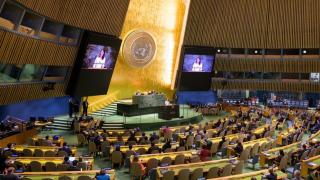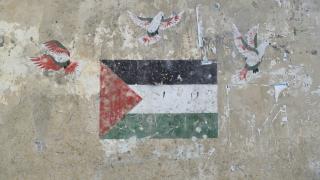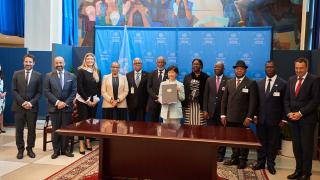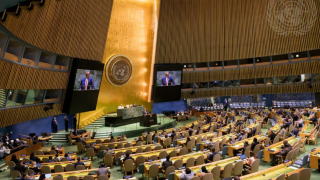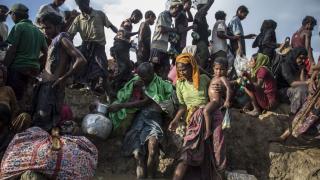
This article is part of our regular series of background briefings on the UN in the news.
In our latest briefing we respond to the recent UN report on violence against the Rohingya population in Myanmar’s Rakhine Province and go through the ways in which our global system can and should respond to it.
What has happened?
Rohingya majority-Muslims in Myanmar have faced decades of systematic discrimination. Since late August 2017, more than 720,000 Rohingya have fled to Bangladesh after a security crackdown that the Myanmar military claimed was a response to attacks on police posts by Rohingya militants. Leading UN officials have warned of brewing violence against the Rohingya for some time; the recent surge of violence is only the latest episode against a backdrop of increased manifestations of religious intolerance against majority-Muslim Rohingya and other minorities in Myanmar.
The UN recently released a report into alleged human rights violations and abuses in Myanmar, calling for a referral of the situation to the International Criminal Court (ICC) and an independent inquiry into the UN's failure to protect civilians in Myanmar. Conducted by the UN’s Fact-Finding Mission to Myanmar (mandated by the UN Human Rights Council in March 2017), the report reveals the harrowing nature of violence against the Rohingya population in Myanmar’s Rakhine Province; pointing to cases where security forces are alleged to have carried out a series of brutal attacks, including extrajudicial killings, rape, torture, and arson.
The report concludes that Myanmar’s armed forces, known as the Tatmadaw, were responsible for war crimes and crimes against humanity against minorities across the country – in the Rakhine, Kachin and Shan areas, which are fragmented by internal conflicts. It also suggests that crimes against the Rohingya could meet the strict legal definition of genocide. Strikingly, the report call for six senior military commanders to face charges.
The mission was denied access to Myanmar but was able to gain an understanding of the gravity of the situation by collecting testimony and information from people who had fled to Bangladesh – Myanmar’s neighbouring country where the majority of Rohingya have sought refuge – as well as to a number of other countries. To ensure evidence was as conclusive as possible, the Mission conducted in-depth fact finding to reveal broader patterns of abuses, and based its findings on other primary sources of information such as satellite imagery, documentation, photos and videos.
A UN failure?
The situation in Myanmar has once again shone a spotlight on personal and structural failings within the UN system. The Mission’s UN report notes that UN bodies operating in the country appeared to prioritise development efforts and advances in democratic reforms at the cost of human rights and the prevention of mass atrocities. A leaked internal UN report commissioned in May last year is alleged to have predicted the crisis, and to have criticised the UN’s response: ignoring or downplaying warning signs and failing to speak out in time or with appropriate clarity.
The findings of these reports closely mirror similar reports produced on UN action in the final stages of Sri Lanka’s civil war, where egregious abuses and atrocities are alleged to have been widespread with nobody, as yet, held to account. The UN’s Human Rights up Front initative (HRuF) was set up as a response to systemic failures identified in the organisation’s handling of that crisis. That it has happened yet again suggests that this response was insufficient.
In our evidence to an inquiry by the House of Commons Foreign Affairs Committee, UNA-UK suggested that this was because the structural changes needed to make HRuF a reality had not yet been made – notably restructuring UN country teams so that they prioritise human rights concerns. This report, and the internal inquiry that should follow, cast doubt on whether these changes will go far enough, particularly given the extent to which Member States have attempted to water down some of them.
What now for Myanmar?
The UN report and its findings demand a response. How can this be achieved?
Human Rights Council (HRC)
The HRC is the main intergovernmental UN body tasked with protecting human rights. It commissioned the report and will consider it at its next session in March 2019. The HRC does not have the authority to refer the situation in Myanmar to the ICC.
ICC referrals can only be made if the country in question accepts the authority of the Court (Myanmar does not). Most cases currently under consideration by the ICC are, in fact, self-referrals. However, the treaty underpinning the Court provides for referrals to the made by the UN Security Council, and the HRC should urge Security Council members – which include the UK – to do so.
The HRC is also constrained in that it cannot – as a subsidiary body of the UN – directly refer things to the Security Council. Again, the UK, which is currently a member of both bodies, could take the lead in placing the report on the Security Council’s agenda. Even if the ICC referral is not secured, this would help generate momentum for action. It would also lay the groundwork for actions by other parts of the UN system, in the absence of adequate action by the Security Council.
This could include further efforts by the HRC, or the General Assembly, to gather evidence of atrocity crimes through an independent evidence gathering mechanism, similar to the IIIM for Syria. Such a mechanism would support the preparation of cases for eventual prosecution – by the ICC or ad hoc tribunal, or by individual states under "universal jurisdiction”.
International customary law holds that certain crimes, such as torture and crimes against humanity, are so abhorrent that we all share a responsibility to prevent and prosecute them. As such, prosecution of these crimes is possible in countries even if neither the victim nor the alleged perpetrator is a national of that country. The UK is well placed to take the universal jurisdiction approach as it has the relevant legislation. Although such an inquiry is not criminal, it can be important in ensuring the international system retains its focus and sense of urgency, as well as safeguarding vital evidence to pave the way for eventual prosecutions.
UN Security Council
The UN Security Council has the power to refer the situation in Myanmar to the ICC or create an ad hoc international criminal tribunal. Both options require the agreement – explicit or implicit through abstention – of all five permanent members (or ‘P5’: the US, UK, France, Russia and China). A Council referral to the ICC has only occurred twice given the general lack of P5 unanimity in situations of mass atrocities.
In the case of Myanmar, opposition would most likely come from China, which has traditionally shielded the regime, and Russia, which tends, like China, to be sceptical of action to address atrocities citing concerns over the erosion of national sovereignty. Neither country is party to the Court. The United States position is less certain. It has historically opposed the ICC and is also not party to it, although it has been content under Republican and Democrat administrations to refer other countries to it. National Security Adviser John Bolton recently made some highly critical statements on the ICC.
Although a referral through the Security Council is therefore unlikely, an attempt to do so would mark the severity of the situation. Further, while the current lack of trust between permanent members makes a compromise unlikely, there have been cases, such as in Darfur in 2005, where supportive states have been able to persuade permanent members who opposed an ICC referral to abstain in exchange for compromises elsewhere.
An ICC investigation
The International Criminal Court can also initiate prosecution without a referral, provided the country to be investigated is a signatory of the Rome Statute. Myanmar is not, but the ICC has recently ruled that it can prosecute Myanmar over alleged deportations of Rohingya from Myanmar to Bangladesh – a signatory of the Rome Statute – as a possible crime against humanity. This is an important and necessary move towards accountability, however it does not enable prosecution for crimes within Myanmar. At best, the ICC will only be able to prosecute a small portion of the crimes identified by the Fact-Finding Mission, and only some of the perpetrators, leaving an impunity gap.
Therefore, states should continue to call for a UNSC referral to the ICC. Failing a referral to the ICC, other accountability mechanisms could be explored, although these are not straightforward.
What else should be done?
In 2005, world leaders adopted the principle of the Responsibility to Protect (R2P) to guide the international community’s response to ethnic cleansing, war crimes, crimes against humanity and genocide. R2P holds that the primary responsibility for protecting populations lies with their governments. If these are unable or unwilling to exercise this responsibility, the international community has a responsibility to take action.
Actions comprise support to assist that state in discharging its responsibility, as well as the graded application of pressure prevent and discourage atrocity crimes. They also include a range of coercive measures (so-called Pillar III approaches) are appropriate to protect civilian populations, and which could be applied to Myanmar.
Non-military coercive measures include targeted sanctions, travel bans, asset freezes and arms embargoes. The UK. EU, or the UN Security Council could impose such measures. Much more should also be done to engage reluctant actors, such as China and Russia, as a unified international stance would greatly increase the pressure on the Myanmar Government to fulfil its responsibility to protect. As with all negotiations, this would probably involve compromises in other areas.
Safe returns?
There should also be more emphasis on the safe return of refugees to Myanmar. At present, there are deep concerns about the safety and well-being of those who return. These concerns are similar to those expressed over Sri Lanka’s post-war humanitarian camps, dubbed internment camps by many. The UN attracted much criticism for appearing to give them support.
Any agreements between UN agencies and Myanmar, therefore, must stress the conditions that need to be in place to provide for voluntary, safe, dignified, and sustainable returns, and protections to ensure Rohingya’s basic rights – conditions unlikely to be met in the near future. Progress on accountability would likely support safe returns. Full citizenship for Rohingya should also be one of the main demands of the international community.
How should the UK respond to the situation in Myanmar?
The UK Government has received significant criticism for its insufficient response to the Rohingya crisis and to other situations where there is a risk of atrocities occurring. Recent parliamentary inquiries have concluded that the UK is failing to ensure adequate prevention strategies; calling for the UK to strengthen its response if it is to live up to its "responsibility to protect".
The current absence of an "atrocity prevention strategy" is considered to have contributed to allegations of selectivity and a sense that the UK pursues atrocity prevention only when it aligns with strategic priorities, when it should itself be a priority. A cross-governmental, comprehensive strategy for the prevention of atrocities is critical in improving the UK's decisive response to atrocity crimes and in preventing future failures like the lack of appropriate action on Myanmar.
As lead country or "penholder" on Myanmar at the UNSC, the UK should use its capacity for multilateral diplomacy to champion both the strongest and the broadest possible response to the ongoing atrocities in Myanmar. The UK has taken some positive steps in putting pressure on Myanmar and in supporting Rohingya refugees in Bangladesh through aid: it has ceased training and engagement with Myanmar’s military and used its UNSC presidency in August 2018 to hold a meeting on Myanmar and another on mediation. The UK has also called for Myanmar to release two Reuters journalists from jail who reported on violence against Rohingya. In response to the latest UN report, Foreign Secretary, Jeremy Hunt, has visited Myanmar to apply pressure.
Yet the UK can still go further. It should seek to table the HRC report, and support a referral to the ICC, making the moral case for the P5 to abstain from blocking progress is an important first step. Alongside this, pushing for accountability by other means, such as via universal jurisdiction, is also important.
In addition, the UK should seek to apply other non-military forms of pressure on Myanmar's Government. The UK can look to support a global arms embargo, urge governments to cease military-to-military engagement and impose targeted sanctions against the Myanmar Army. Other options include considering taking away any honours the UK Government has gifted to Aung San Suu Kyi.
As ever, processes and policies can only go so far. It is political will that is needed. Just before stepping down as UN High Commissioner for Human Rights, Zeid Ra’ad Al Hussein warned that one of the greatest threats to future peace is the possibility of war driven by tensions between Muslim and Buddhist extremists, exacerbated by our failures to prevent atrocities in flash points such as Myanmar and Sri Lanka. Failure to respond to Myanmar now will only make further conflict, and further atrocities, more likely.

